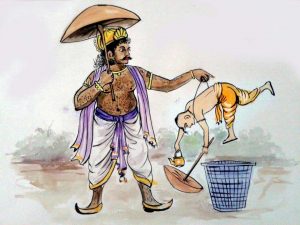Bali was present at so many times and places that the mythmakers had to employ one of their greatest discoveries, the various periods of the Manus (manvantaras), a repeating of the cosmic ages each with its own “first man” (Manu). Thus the stories of Bali and his deva (god) opponents were never in conflict.
Mahabali (or “great” Bali) was present at the Churning of the Ocean in the Cakshusa-manvantara, the period ruled by the Manu Cakshusa. He fought Indra and the gods, constantly defeating them with the magic of mritasanjivani (life restoration) taught by their great guru Sukra. So complete were his victories over the gods, that his priest (Sukra performed the sacrifice of visvajita (conqueror of the world), and Bali completed one hundred asva-medhas (horse sacrifices). (For a description of an asva-medha see under “Yudhishthira.”) Bali was anointed as king of heaven—he had become an Indra.
The asuras possessed amrita (the magical no-death nectar) and its container. Once when Bali was killed in a battle with the gods, the demons carried his dead body to their teacher (Sukra, and Bali was brought back to life. He completely drove the gods from the heavens, but in his victory he denied both devas and brahmins (priests) their due. So with the help of the priests, the gods were finally able to appease Lord Vishnu, who had been upset with their pretenses. They realized that Bali’s devotion to Vishnu was the reason for his triumph over the gods and that it had been the ultimate reason for Bali’s invincibility. Only Vishnu could contrive a plan that would both restore the devas’ rule over heaven, their dharma, and reward his devotee Bali with a greater destiny.
So Bali’s story folded into the more significant story of the incarnation of Vishnu as Vamana, the dwarf. In that incarnation, Vishnu defeated Bali by his very devotion to Vishnu and confined Bali to Patala (the netherworld, hell).
Some accounts gave the Bali myth a perfect bhakti (devotional) ending. Vishnu incarnated as a small, some say dwarf, brahmin who came to Bali and was honored by him. Even when his own priest and advisor recognized Vishnu and warned Bali, the king granted the young brahmin a wish. And the wish—for all that could be covered by his three steps—ended in Bali losing everything. Some versions have Garuda, the sun eagle, binding Bali and taking him to Patala. Other versions had Vishnu rewarding Bali with a direct entrance into heaven. There was one account that said that Bali became a chiranjeevi (one who lived forever), just like Hanuman, the faithful servant of Rama.
Bali played a role in Valmiki’s Ramayana in an encounter with the demon Ravana. Ravana went to Patala to free Bali but could not even obtain the earrings of Bali’s great-grandfather, Hiranyakashipu. Ravana returned to Lanka in shame. In a myth featuring the goddess Lakshmi, Bali’s loss of his kingship of heaven came from his neglect of service to the brahmins.

